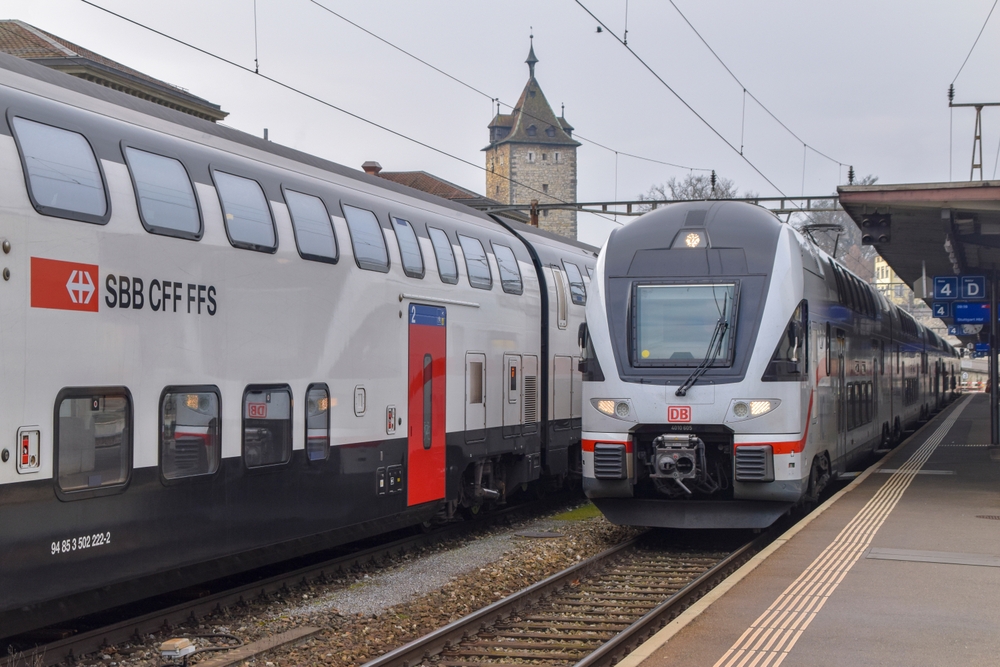Switzerland will later this year open its railways to European competition for the first time, allowing foreign operators to run international passenger trains entirely under their own banners. It’s a break with decades of tightly protected public service tradition — but what will this controlled liberalisation really mean on the ground?
Switzerland and the European Union have finalised an update to their Land Transport Agreement, which will, for the first time, allow European railway companies to independently run their own international passenger services into and across Swiss territory. While the change, part of the wider Switzerland-EU bilateral package, was signed off by the Swiss Federal Council in December 2024, further details were released earlier this week.
Until now, EU operators could only enter Switzerland through cooperation agreements with Swiss operators, typically SBB, meaning all cross-border trains were jointly operated, branded, and staffed. The updated agreement introduces what is being described as a controlled liberalisation, enabling EU companies to launch their own branded, independently operated international services into Switzerland, provided they comply with a strict set of Swiss regulatory and social standards.
Set to enter into force alongside the full package by summer 2025, the framework explicitly excludes domestic Swiss services from liberalisation, meaning EU companies still cannot run services like Geneva–Zurich without crossing into EU territory. However, operators such as DB, SNCF, or Trenitalia will now be able to offer, for example, a Berlin–Zurich or Paris–Bern service entirely under their own name, without needing to partner with SBB.
Foreign operators will be required to comply with Swiss laws on working hours, wages, holidays, and benefits, with a dedicated directive being drafted by the Swiss government and due by summer 2025. The directive will also outline how these rules are enforced, monitored, and what sanctions will apply in case of violations. Operators may also have to integrate into Switzerland’s national tariff system, accepting Swiss travelcards and domestic half-fare rates, while also being subject to capacity limits to avoid disruption to Swiss passenger and freight services.
Union fears over ‘dangerous’ liberalisation
Despite the tight conditions, the deal has triggered a concern from Swiss trade unions, who argue that any opening of the market, even in a controlled manner, risks undermining public service protections and working conditions. The Swiss Trade Union Federation (USS), supported by the European Trade Union Confederation, warns the move opens the door to wage dumping, job precarity, and downward pressure on employment standards, similar to developments seen in Germany’s fully liberalised rail market.
At a meeting in Bern earlier this year, USS delegates unanimously rejected any Switzerland-EU agreement lacking robust protections for public services and pay, calling on the Federal Council to toughen its position and warning that the agreement will face union opposition without enforceable safeguards. Whether the current measures are acceptable to the unions remains unclear.
What does the deal actually change for Switzerland?
As stated previously, while cross-border services between Switzerland and the EU have long existed—Zurich–Frankfurt (SBB-DB), Geneva–Paris (SBB-SNCF), Zurich–Milan (SBB-Trenitalia)—these have been operated exclusively through partnerships, with no room for EU operators to independently run services under their own banner or business model.
The updated agreement now opens that possibility, aligning Switzerland more closely with the EU’s Fourth Railway Package, and reflecting the broader push across Europe to liberalise international passenger rail services.
However, in reality, the changes may be more symbolic than disruptive in the short term. State-owned incumbents like DB, SNCF, and Trenitalia—already operating cross-border services under partnerships—are best placed to expand under their own brand should they choose to do so.
Low-cost challengers such as FlixTrain or Renfe face a tougher climb, given the combination of high operating costs, mandatory Swiss social standards, tariff system integration, and limited capacity on an already saturated network.
SBB’s dominant role unlikely to be challenged
Essentially, while the agreement technically opens new space for international operators, in practice, SBB is expected to defend its dominant position vigorously, backed by Swiss authorities and strong public support for the national public service model.
Any new entrants – whether they already have a presence in Switzerland or not – will face high regulatory, financial, and operational hurdles, from complying with Swiss labour and tariff rules to navigating limited capacity on an already crowded network.
The result is that the market space created by the agreement will likely remain narrow and firmly on Swiss terms— which means SBB’s central role in cross-border passenger services, at least in the near term, will stay for the most part unchallenged.
Read more:
You just read one of our premium articles free of charge
Want full access? Take advantage of our exclusive offer
Are you already a subscriber?


